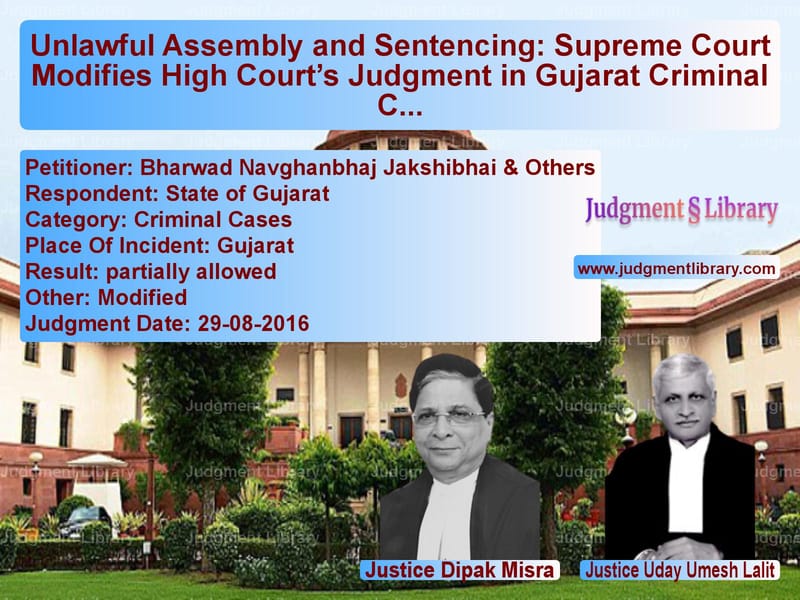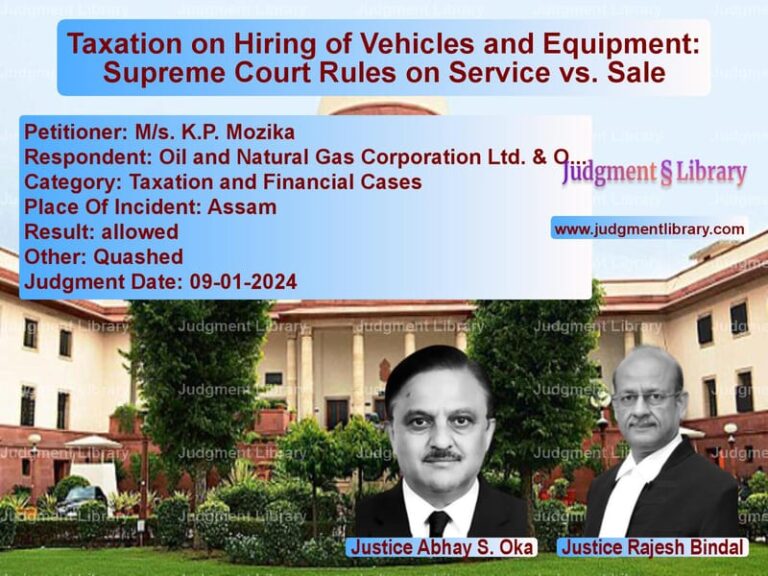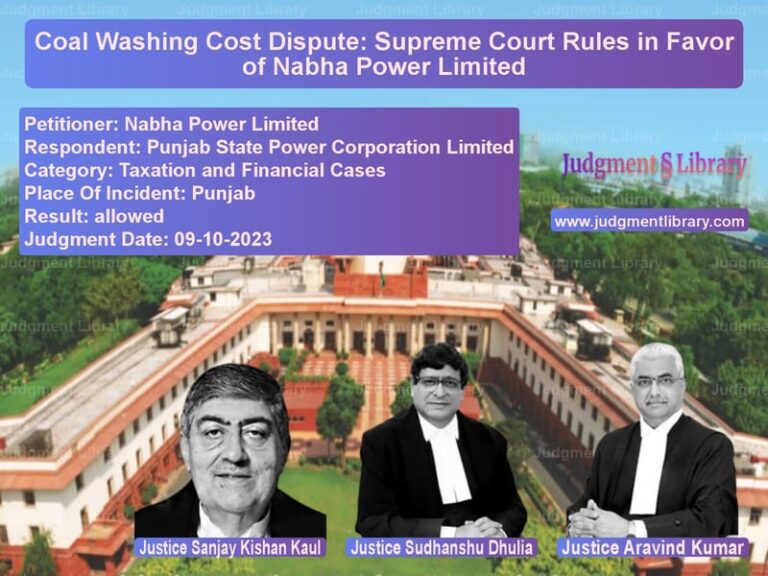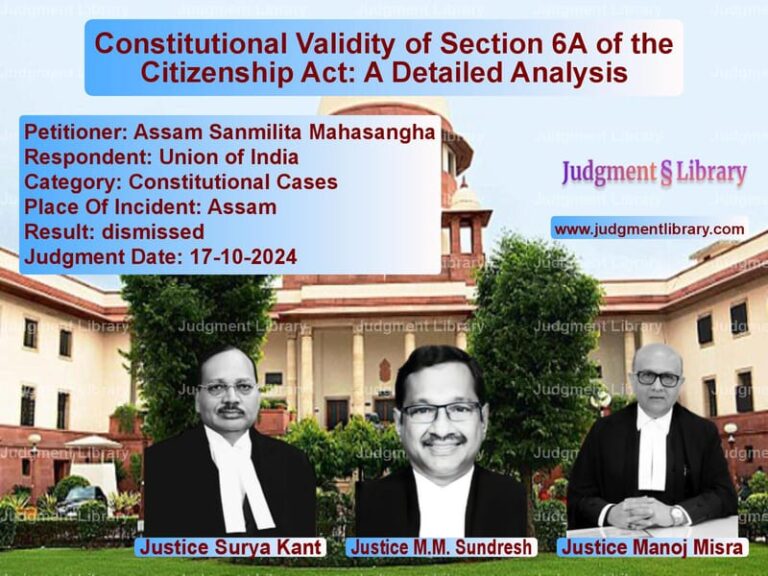Unlawful Assembly and Sentencing: Supreme Court Modifies High Court’s Judgment in Gujarat Criminal Case
The Supreme Court of India, in the case of Bharwad Navghanbhaj Jakshibhai & Others vs. State of Gujarat, addressed critical legal questions regarding unlawful assembly, individual liability, and the principle of proportionality in sentencing. The case originated from a violent incident in Gujarat, where a group of 14 accused individuals attacked the complainant, resulting in serious injuries.
Background of the Case
The case arose from an altercation in which the complainant was attacked by a group of accused wielding weapons such as sticks and sharp instruments. The prosecution alleged that the attack was motivated by a previous dispute involving a collision between a tractor and a motorcycle. The accused were convicted by the Sessions Court and sentenced under various sections of the Indian Penal Code (IPC).
The convicted individuals challenged their sentences before the Gujarat High Court. While the High Court upheld the conviction, it enhanced the sentence under Section 326 IPC from two years to five years. Aggrieved by this enhancement, the accused approached the Supreme Court.
Charges and Convictions by the Trial Court
The accused were convicted under the following IPC sections:
- Section 147 and 148 IPC: Unlawful assembly and rioting – fine of Rs. 1,000.
- Section 326 read with Section 149 IPC: Voluntarily causing grievous hurt by dangerous weapons – 2 years of rigorous imprisonment.
- Section 324 and 149 IPC: Voluntarily causing hurt by dangerous weapons – fine of Rs. 2,000.
- Section 325 read with Section 149 IPC: Voluntarily causing grievous hurt – 2 years of rigorous imprisonment.
- Section 504 and 506(2) IPC: Intentional insult and criminal intimidation – no separate sentence.
Arguments by the Appellants
The appellants raised the following arguments before the Supreme Court:
- There was an over-implication of accused persons as 14 individuals were charged for only 8 injuries on the complainant.
- The injuries sustained were not life-threatening, and a five-year sentence was excessive.
- The conviction should be reconsidered, and instead of increasing the prison term, a higher fine should be imposed as compensation.
Arguments by the Respondents
The State of Gujarat countered the appellants’ claims with the following arguments:
- All accused formed an unlawful assembly and actively participated in the attack.
- The victim suffered multiple injuries, including fractures, which justified the enhanced sentence.
- The High Court’s decision to enhance the punishment was appropriate given the seriousness of the offense.
Supreme Court’s Observations
The Supreme Court carefully examined the case records and the findings of the lower courts. The Court noted:
“The conclusion arrived at by the High Court rightly sums up the matter in the following words: ‘All of them were members of an unlawful assembly with a common object. All of them attacked the original complainant-injured eyewitness at his place. All of them were charged for the offense under Section 149 of the IPC and convicted accordingly.’”
The Court reaffirmed that in cases involving unlawful assembly, each member is vicariously liable for acts committed by the group.
Final Judgment
The Supreme Court upheld the conviction but modified the sentence as follows:
- The original sentence of 2 years of rigorous imprisonment under Section 326 IPC was restored.
- The High Court’s enhanced sentence of 5 years was reduced.
- The compensation amount to be paid to the victim was increased to Rs. 55,000 per accused.
- The amount deposited by the original accused Nos. 1 and 7 (Rs. 70,000) was directed to be transferred to the complainant.
- Accused who had already deposited Rs. 35,000 each were required to pay an additional Rs. 20,000.
- Failure to deposit the compensation would result in an additional one year of imprisonment.
- The accused were directed to surrender within one month to serve their sentence.
Implications of the Judgment
The Supreme Court’s ruling has significant implications:
- Reinforcement of the Unlawful Assembly Doctrine: The judgment highlights that all members of an unlawful assembly are liable for the actions of the group.
- Balanced Approach to Sentencing: By reducing the enhanced prison term and increasing compensation, the Court ensured fairness in punishment.
- Judicial Review of Sentence Enhancements: The Court emphasized the need for proportional sentencing and careful assessment of enhancements by appellate courts.
Conclusion
The Supreme Court’s decision in Bharwad Navghanbhaj Jakshibhai vs. State of Gujarat reaffirms the importance of the unlawful assembly doctrine while ensuring that sentences remain fair and proportionate. The ruling strikes a balance between penal consequences and victim compensation, ensuring justice for both parties involved.
Don’t miss out on the full details! Download the complete judgment in PDF format below and gain valuable insights instantly!
Download Judgment: Bharwad Navghanbhaj vs State of Gujarat Supreme Court of India Judgment Dated 29-08-2016-1741878569857.pdf
Direct Downlaod Judgment: Direct downlaod this Judgment
See all petitions in Attempt to Murder Cases
See all petitions in Fraud and Forgery
See all petitions in Theft and Robbery Cases
See all petitions in Judgment by Dipak Misra
See all petitions in Judgment by Uday Umesh Lalit
See all petitions in partially allowed
See all petitions in Modified
See all petitions in supreme court of India judgments August 2016
See all petitions in 2016 judgments
See all posts in Criminal Cases Category
See all allowed petitions in Criminal Cases Category
See all Dismissed petitions in Criminal Cases Category
See all partially allowed petitions in Criminal Cases Category







